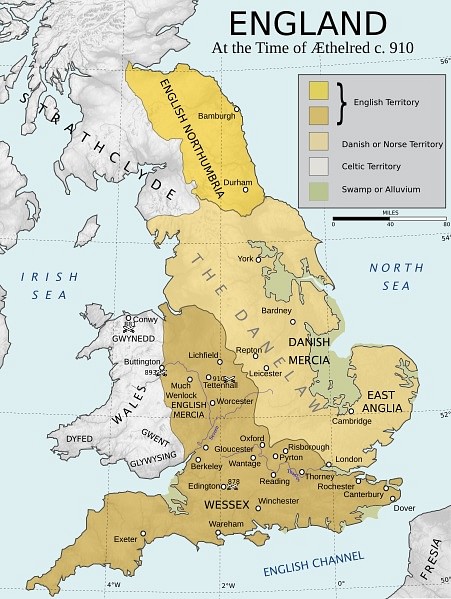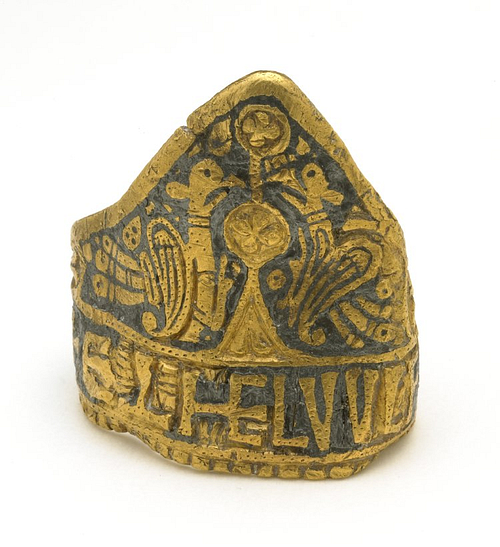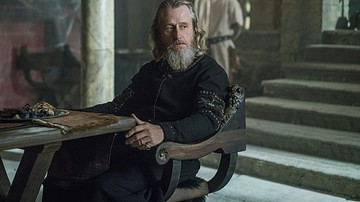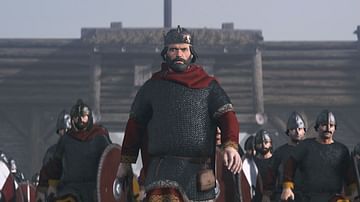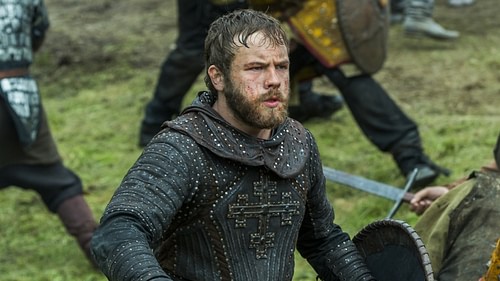
Aethelwulf (r. 839-858 CE) was King of Wessex, a region in modern-day Britain, son and successor to Egbert of Wessex (r. 802-839 CE) who had unified and expanded his kingdom with Aethelwulf's assistance. Aethelwulf fought at the Battle of Ellandun in 825 CE, defeating the Kingdom of Mercia and taking significant territories which he then ruled as sub-king under Egbert's supervision. He was married to the princess Osburh (c. 839-c.854 CE), daughter of Oslac (Aethelwulf's butler and confidante), with whom he had a daughter and five sons, the youngest of which was Alfred the Great (r. 871-899 CE). Osburh exerted significant influence over her children in religion and literacy, most notably in Alfred's case, but there is ample evidence that Aethelwulf also influenced his son just as much. Aethelwulf is remembered as a pious king whose defining characteristic was the care he showed to his people as a reflection of his devotion to the church. He is featured in the TV series Vikings (played by actor Moe Dunford) but the character significantly departs from his historical counterpart in a number of ways.
Early Life & Rise to Power
Aethelwulf's birthdate is unknown as is the name of his mother. He was the only son of Egbert and would have probably grown up in Wessex. Egbert went into exile in Francia in c. 786 CE after he challenged Beorhtric (r. 786-802 CE) for the kingship of Wessex. Beorhtric was supported by Offa, King of Mercia (r. 757-796 CE), a kingdom Wessex had been at war with, on and off, for years. It is unlikely that Aethelwulf was born at this time and more probable his birth came after Egbert was king in 802 CE.
Very little is known of the first 20 years of Egbert's reign and nothing of his son's life during that period. Egbert led his army in a conquest of the region of Dumnonia (modern Cornwall) c. 815-820 CE and it is probable that Aethelwulf took part in these campaigns although no mention is made of him. His name first appears in the Anglo-Saxon Chronicles in the entry for the year 825 CE referencing the Battle of Ellandun.
Mercia had been the dominant kingdom in the region for centuries and conflict between the Mercian kings and those of Wessex was commonplace. Wessex had been under Mercian control throughout the reign of Beorhtric but when Egbert became king he is said to have asserted Wessex's independence – though no details are given as to how he did this. He seems to have built up his army during the first 20 years of his reign and may have conquered Dumnonia for the resources he needed.
In 825 CE he attacked Mercia and defeated the Mercian king Beornwulf (r. 823-826 CE) at Ellandun (modern-day Wiltshire). Aethelwulf was made sub-king of the regions taken from Mercia (Kent, Essex, Sussex, and Surrey) and supported Egbert's further campaigns between 827-829 CE until, by 830 CE, Wessex controlled the regions of Britain from its kingdom in the south up through Northumbria in the north.
King of Wessex
During this time, Egbert secured the succession of Aethelwulf through contracts made with the church. The support of the powerful Archbishop of Canterbury, Ceolnoth (to whom Egbert gave significant tracts of land), guaranteed this succession. When Egbert died in 839 CE, Aethelwulf became king without challenge from any of the West Saxon nobles.
He was already married to Osburh by this time and his eldest son Athelstan (r. 839-c.852 CE) was old enough to be named sub-king of Kent, Essex, Sussex, and Surrey. Aethelwulf initiated a policy of control-through-appeasement in granting land to various West Saxon nobles and extending goodwill toward Mercia through contracts and negotiations. Physical proof of Aethelwulf's policy toward his nobles was discovered in 1780 CE the form of a ring bearing his name. The ring is engraved with an image of two peacocks flanking the Christian tree of life and `Aethelwulf Rex' (Aethelwulf the King) beneath it. It is thought that these rings were given to nobles loyal to the king.
Between 844-855 CE, Aethelwulf issued the now-famous and controversial Decimation Charters (so-called because each one releases a tenth of the kingdom from service and tribute to the crown). These charters may have been intended to relieve the tax burden of the regions and elevate the standard of living, could have been issued to secure further support from nobles and the church, may also have been intended to increase support or reward certain nobles for assistance against Viking raids, or may not have meant anything at all.
The charters are controversial in the modern day because scholars cannot agree on what their purpose was or even, in some cases, whether the documents are even authentic. A number of scholars have claimed the charters are fakes which were created later to elevate Aethelwulf's reign. If the charters were issued beginning in 844 CE to reward nobles for support against the Vikings it would make sense since the Vikings struck in 843 CE and Aethelwulf clearly was unprepared for the onslaught.
In that year, Athelwulf was defeated at Carmouth – just as Egbert had been – by a Viking force of 35 ships. These seem to have been different Vikings from those who defeated Egbert in 836 CE but a Viking colony had most likely been established at Carmouth in the 830's CE to facilitate later raids. Viking raids may have continued on a smaller scale between 843-851 CE but, if so, they would have been reconnaissance missions rather than actual raids.
In 851 CE, however, the Vikings arrived in full force with 350 ships which came up the Thames to strike Canterbury and London. Aethelwulf coordinated a defense with his son Aethelbald (r. 855-860 CE) on land while Athelstan and the Earl Ealhhere of Kent led a fleet to engage the enemy at sea. The West Saxon forces were victorious and the remnants of the Viking force retreated. Athelstan is presumed to have died shortly after this, however, possibly of wounds. He is not mentioned in any records after 852 CE.
Pilgrimage to Rome & Rebellion
To strengthen the bond between Wessex and Mercia in the face of Viking aggression, Aethelwulf arranged the marriage of his only daughter Aethelswith (c. 838-888 CE) to the Mercian king Burgred (r. 852-874 CE) in 853 CE. A ring inscribed with Aethelswith's name was discovered in Yorkshire in 1870 CE and, like Aethelwulf's, is thought to have been given to a noble loyal to her and Burgred as a symbol of office.
Osburh died about this same time (c. 854 CE) and this may have been the inspiration for Aethelwulf's famous pilgrimage to Rome where he was accompanied by his son Alfred. In Alfred's biography, the scribe Asser notes that Alfred took this journey when he was four or five years old. Alfred was born in 849 CE so an approximate date of 854 CE for the Rome pilgrimage would match. Aethelwulf's motivation may also have been to seek divine guidance in handling the Viking threat or some unknown reason. It seems strange, however, that a sitting king would leave on a lengthy pilgrimage so soon after a substantial threat to his kingdom presented itself.
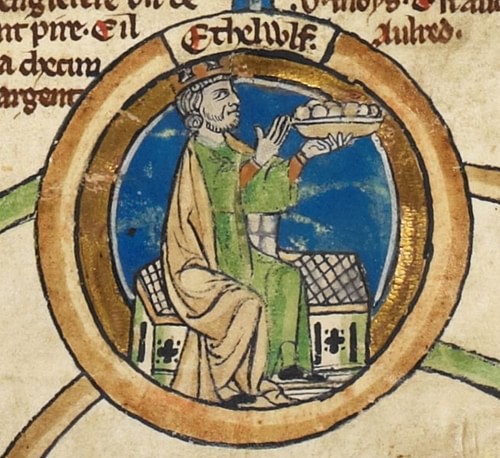
For whatever reason, Aethelwulf left for Rome with Alfred and a large entourage and remained away a year. He left Wessex under the rule of Aethelbald while Kent and the other regions were given to his next eldest son Aethelberht (r. 860-865 CE). The pilgrimage and meeting with the Pope would have a lasting impact on young Alfred. As scholar Joann Arman notes, “In his later life, Alfred would interpret the trip to Rome that he made when he was four or five years old as the first confirmation of his destiny” (25).
On the way there, the pilgrims stopped at the court of Charles the Bald (r. 843-877 CE), King of West Francia. They then continued on to Rome, met with the Pope (who allegedly anointed Alfred king), and remained there for some certain amount of time. On the way home, the group again stopped at the court of Charles where it was arranged that Aethelwulf would marry Charles' teenaged daughter Judith. Once the marriage festivities were concluded, the entourage returned to Wessex.
There is no evidence that Aethelwulf communicated with Aethelbald back home regarding his intentions and nothing that indicates he told Aethelbald why he was going to Rome or when he might return. When he did come back, however, it was with a young bride whose allegiance was to a foreign king. Aethelbald did not react well to his father's return and refused to hand Wessex back to him.
Historians have long characterized Aethelbald's action as a `rebellion' but it seems far more a case of common sense for him to have taken control of a kingdom when the former king had gone missing for a year and returned with the daughter of a foreign king as his new bride. Part of the stipulations of the marriage made clear that Judith was to be addressed as `queen' which was standard in West Francia but forbidden in Wessex; the woman married to the king in Wessex was simply `wife of the king', not `queen'.
Athelwulf's disregard for Wessex tradition and his long absence may have suggested to Aethelbald that his father was unfit to continue to rule. Further, Aethelbald had historical precedent for assuming that his father would not return from Rome and so had ruled accordingly in his absence. A former king of Wessex, Caedwalla (r. 685-688 CE), after cutting the power to the sub-kings, uniting the kingdom, and expanding its reach, abdicated to make a pilgrimage to Rome and never returned. When he left, the kingdom divided as the sub-kings asserted their former power and everything he had accomplished was swallowed up in conflict.
Aethelbald's so-called `rebellion', therefore, should probably be redefined as it seems he was actually trying to prevent anything like a rebellion on the part of his supporters. Aethelwulf, to his credit, respected his son's choice – even though he had considerable support in reclaiming the throne. Rather than provoke a civil war by forcing the issue, Aethelwulf divided the kingdom between Aethelbald, Aethelberht, and himself.
Death & Successors
Aethelwulf took the center of the kingdom as his own and devoted himself to charity work and giving gifts to the church. His will is lost but is referenced in the will of Alfred where it is said that Aethelwulf provided for the poor of his kingdom in perpetuity as well as leaving sums of money and land grants to the church and stipulations of annual donations sent to Rome. He died of natural causes in 858 CE and his kingdom was divided between Aethelbald and Aethelberht. To consolidate his reign and elevate his prestige, Aethelbald married Judith. When he died in 860 CE, Aethelberht united the kingdom under his reign and Judith returned to her father in West Francia.
Aethelberht discontinued the policy of placing a sub-king over Kent and the other regions and ruled the whole of Wessex, incorporating every reach of it into his kingdom. He died in 865 CE and was succeeded by his younger brother Aethelred (r. 865-871 CE) whose reign was characterized chiefly by war with the Vikings. In 865 CE the Great Heathen Army led by Ivar the Boneless, Halfdane, and others invaded Britain in force. They conquered Northumbria and made their way down toward Wessex.

Aethelred was no match for the Vikings who defeated him in almost every encounter except for the Battle of Ashdown in 871 CE and that victory was won by the twenty-two-year-old Alfred, not Aethelred. When Aethelred died in 871 CE, Alfred took the throne and, after a number of setbacks, would eventually defeat the Vikings at the Battle of Eddington in 878 CE and set in motion policies and procedures which would lead to the development of Britain as a single, unified kingdom under his grandson Athelstan (r. 927-939 CE), the first King of England.
Aethelwulf in Vikings & Legacy
In the TV series Vikings, Aethelwulf's character is depicted as being somewhat dull-witted, easily angered, and frequently manipulated by his father; none of which bears any resemblance to the historical figure. In the show, his marriage to Judith (a princess of Northumbria) is arranged by his father Ecbert and she gives birth to Aethelred and, through an affair with the cleric Athelstan, Alfred. Aethelwulf is further seen allying himself with Ragnar Lothbrok in the interests of Mercia, slaughtering innocent Viking settlers in Wessex, demanding that Judith's ears and nose be cut off for her adultery with Athelstan, and engaging in an affair with the Mercian queen Kwenthryth, none of which have any historical basis.
The character most closely resembles the historical Aethelwulf on the Mercian campaign, when he chooses to listen to the Mercian captive and spare him rather than torturing and killing him (Season 3:2) and when he rescues Kwenthryth in Mercia (Season 4:2). The series is not intended as factual history but as entertainment and frequently draws on a number of historical figures or incidents in creating the characters and story arcs. In the case of Aethelwulf, the character is an amalgam of West Saxon leaders but bears the closest resemblance to Caedwalla who was known as a great warrior, quick-tempered and intolerant, who massacred the pagan population of the Isle of Wight.
The actual Aethelwulf was characterized by his tolerance, piety, and consideration for others. It is these characteristics, in fact, which led to him being underrated as a weak and ineffectual king by historians as recently as the 20th century CE. Unlike his father, Aethelwulf did not engage in large-scale campaigns and those he was involved in, such as Ellandun in 825 CE, were orchestrated by Egbert. These early histories, however, often concentrated on a king's power as displayed by military might. Aethelwulf's strength lay in his willingness to listen to others, concede points, and recognize that his way was not necessarily always the best. His greatest legacy was the effect he had on his son Alfred who would display these same characteristics.
